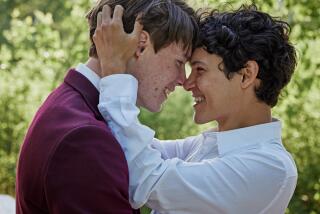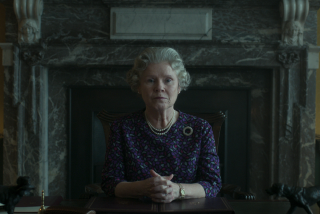We talked to ‘The Handmaid’s Tale’ showrunner Bruce Miller about that Season 2 finale
[Warning to readers: This article contains spoilers about the Season 2 finale of “The Handmaid’s Tale.”]
The second season of “The Handmaid’s Tale” could have easily been subtitled “What to Expect When You’re Expecting in Gilead.”
The Hulu drama, an adaption of Margaret Atwood’s 1985 novel, spent much of its sophomore outing delving into the complexities of being a mother — whether biological or not — amidst the intense dystopian horrors of a theocratic regime known as Gilead.
The Emmy Award-winning series reached its Season 2 finish line on Wednesday in climactic fashion. Having recently given birth to a baby conceived for her commander Fred Waterford (Joseph Fiennes) and his wife Serena (Yvonne Strahovski), heroine handmaid June/Offred (Elisabeth Moss) finds herself fleeing for freedom — baby in tow — in the final moments of the episode with help from a band of Marthas, the class of women who serve as domestic servants to wealthy families. But it’s not a completely triumphant sequence.
‘The Handmaid’s Tale’: A deeper look at the chillingly prescient second season »
When she arrives at the van that will whisk her to safety — along with fellow handmaid Emily/Ofsteven (Alexis Bledel), whose ticket to freedom comes from a different set of helping hands — June doesn’t get inside. Instead, she hands her baby off to Emily because she’s unwilling to leave behind her other child, Hannah, who she was separated from after Gilead came into existence.
In a phone interview, showrunner Bruce Miller talked about June’s decision to stay in Gilead, going off book in Season 2, and the show’s continued connection to the real-world politics of today.
You’ve said from the start that Season 2 would explore motherhood. How did you decide how that would play out in the finale moments where June/Offred, on the brink of escaping to freedom, chooses to stay in Gilead because she won’t leave her daughter, Hannah, behind?
A lot of it has been about June defining what it means to be a mother and trying to teach Serena how to be a mom. At some point in the season, even though June has hopes — hoping that she’ll get out, always hoping her child gets out — she’s not an impractical person. She thinks. “Well, you know this kid is gonna end up probably with Serena and Serena is rather unpleasant. How can I teach Serena as much as I can to be a good mom in the time that I have?”
In the end, we thought the moment of definition for a mom is: What are you willing to sacrifice? How much danger are you willing to put yourself in for your child, how much are you willing to risk? And so I think in the end, what she feels when she puts the baby on the truck is, “I’ve gotten this baby safe. Look what I did. I’m giving this baby over ... I’m about to take this baby to safety.” And what goes through her mind then is, “And my other baby, my other child.” [Hannah] said something to her when she last saw her in Episode 11. She said, “Why didn’t you try harder to find me?” So [June] is trying harder.
A lot of [season 2] has been about June defining what it means to be a mother and trying to teach Serena how to be a mom.
— Bruce Miller, showrunner of “The Hanmaid’s Tale”
This season goes off-book. And you’ve said that you’ve been thinking about what happens next since you read the book in college. How much of what you guessed made it into this season?
One thing I always wondered was what happened with the relationship in the book between June and Nick [Commander Fred’s right-hand man, who happens to be the true father of June/Offred’s baby]. It seemed like almost this wartime romance. If they had met outside yoga class, would they then have been together? The thing that I wanted to explore when I got to the end of the novel, was: How does that relationship grow into a real relationship and what kind of relationship does it grow into?
Critic’s picks for Emmy nominations: Expect ‘Handmaid’s Tale’ and ‘Atlanta’ »
There’s so much in the book between the commander and Offred, which is a fantastically drawn relationship. The misogyny behind it because of the power differential … just the calm to which she has to approach her rapist every day. Offred’s relationship with Serena is so cold and distant in the book that you never have a chance to get past that. Extending it, making her pregnant, and making them have to spend time together and figure out a way to get along was interesting — they’re both very begrudgingly respectful of the other woman, just as we are. Because as much as you wanna hate Serena, she’s fascinating and strong and in some ways a subject of her own terrible regime.
We also started out the season with some ideas — the handmaids reclaiming their name, what it means to be a mom. June’s relationship with her mother and this idea of whether June is stronger than she thinks. That is the fundamental question going through her mind when we reach the end of the season and boy, she is making some decisions. She’s saying, “maybe I am stronger than I think. And maybe I should have tried harder. And something happened right now that I never thought would happen. I got my baby out. That was never gonna happen. So who knows. What impossible thing could happen tomorrow?” What she’s realizing is that you stay alive and you keep trying and things happen that you never, ever, ever would have said were possible.
What’s the balance you have to strike when thinking about the long term with this story? You can’t have June nearly escaping too many times without frustrating the audience.
Yes. Not just from a dramatic storytelling point of view but from a practical point of view in terms of making her a character that you believe. I think there’s plenty of stories to tell after she gets out of Gilead or ends up operating in the shadows of Gilead or ends up in another situation in Gilead that isn’t as oppressive and cruel. There’s no storytelling reason where I feel like we have to reset and go back to the franchise of the show. What we’re trying to do is follow her through this. What starts out as very much the story of a normal woman, and gradually she grows and changes and she gets to be a bit more of the historical figure you remember from the story of Gilead. What we’re trying to make sure that she does, is that she makes decisions based on not just the person she was before Gilead, but the person she’s become in Gilead.
I think there’s plenty of stories to tell after she gets out of Gilead or ends up operating in the shadows of Gilead ...
— Bruce Miller, showrunner of “The Handmaid’s Tale”
Let’s talk about Aunt Lydia (Ann Dowd). Despite her role in Gilead as a willing perpetrator of this society, there’s nuance to the character’s so-called evilness. All of which made the scene where Emily attacks Aunt Lydia so dynamic. There’s satisfaction, but it’s brief because reality sets in.
I was hoping we’d get a conversation between Emily and Aunt Lydia because of just the horrible torture that Aunt Lydia visited upon Emily and the violation of her body. But the nature of that conversation grew out of Alexis’ performance of this kind of coiled rage.At the beginning of the season, you think, “Aunt Lydia will chew her up and spit her out.” But by the end of the season, you’re like, “I don’t know if Aunt Lydia would chew her up and spit out.” It speaks to how formidable both of these women are. Aunt Lydia is such a strong, devoted personality. And Emily is so intelligent and strategic, but also so much more full of rageful strength, I think, than she thought she was when it comes out. So I think putting them together and saying, “OK, how would Lydia, out of hubris, poke the tiger that is Emily? And what would the tiger do?”
And just to confirm: this is not the end of Aunt Lydia, right?
It’s not the end of Aunt Lydia.
And then there’s Serena, who has gone through such an evolution this season and has come to realize some of the horrors of this world she has helped create. What interested you in what you could explore with her character?
Serena’s a very strong woman. She’s very intelligent, she can also get very very mad, and I think loses control of herself a little bit. I think that that’s the lesson that she learns in the season about what kind of mother she might be: that she doesn’t have a ton of control over her anger and maybe that would be something she should nail down before she brings a kid into this world…She has this very, very deep love for her child but also this understanding that Gilead might offer challenges for the baby and those challenges seem to be worse and worse. Like ending up at the bottom of a swimming pool or having your finger cut off you know — the horrors done to women in these last few episodes. And that has convinced her to let her baby go.
To that point — this show, from the start, has prompted talk of the ways in which it feels eerily prescient. Those comparisons seemed to have increased with headlines in recent weeks involving the current administration — whether it be family separations or the Supreme Court vacancy. How does that affect you or what you and the writers are doing, particularly as you think about the next season?
I think it’s scary and sickening the same way it is for everybody else. Maybe a little bit more for us because we know we’ve done more thinking about what Gilead would be like and what a totalitarian state would feel like in America.
We would be very happy if our show was irrelevant. I would do anything to make the show, in this case, much less prescient, much less relevant. But we are human beings and citizens and people who read the news before we’re writers, because that’s what you try to bring into the room. And we’re just as shocked as anybody else when something from our show shows up in the newspaper. But on the other hand, as we’ve said a lot of times, we don’t do anything in the show that doesn’t happen in the world. So things happening in the world and things moving and happening in America just means we’re catching up, sadly, to some of the bad things in the world, which is not the direction we want to be going. We try to think of it as citizens and human beings and friends and members of society, and then think about, “Oh, OK, well, what does this mean in terms of our show?”
What do you say to the people who have stopped watching because they feel it’s too bleak or brutal or mirrors the real world in ways they don’t want from a TV program?
There’s two sides of my brain. One side of my brain says, ‘Of course, go be entertained in the way that you want. Some people want to be entertained in a way that’s escapist, some people want to be entertained in a way that makes them think about the world around them a little bit more. And it depends on your mood. I watch a lot of “Anne With an E” with my daughter — it’s not “The Wire,” but we love watching it. And I watch “The Big Bang Theory.” I get it. Our show is a tough show. It was a tough book. A really tough book. And bringing it to life does not make it any easier. And certainly if you feel triggered by it or whatever, people, of course, should turn it off. On the other hand, this stuff’s happening in the world and just because we don’t see it, or it isn’t revealed to us, doesn’t mean it isn’t happening. It just means it’s happening more because we don’t understand how horrible it is. So if we are being graphic about things, we’re being graphic about things that are happening just out of our sight. And to bring them into our sight I think is a general good.
Can we please talk about the song choices in the finale. You give us Talking Heads’ “Burning Down the House,” Annie Lennox’s “Walking on Broken Glass”—
I think really everything in the show, point of view is very important. So “Burning Down the House” is June’s feeling at the end: It’s time to fight. Blessed be the fight. She’s not in the “I’m a wonderful mommy” mood. I think she’s in the “I’m a wonderful mommy and I’m going to kick someone’s ass” mood.
With “Walking on Broken Glass,” the key to that song was tone deafness. If you’re Emily, you’re sitting in the back after you’ve done something violent. You basically assume, they’re going to tear me apart like warm bread. I’m going to die in the most painful way I can imagine at the end of this car ride. This is my last car ride. And from Lawrence’s point of view, he’s like why is she so nervous? You know, I’m helping her. Can’t she get that? And so what you want is the tone deafness of I’m just going to put on a song to calm us down. And then the audience and Emily’s like, “Oh, my God, are they going to drag me over broken glass?” So what you want is something that she thinks is light and fluffy, and every word pops out at her. And also just the voice, Annie Lennox’s voice, is so iconic and so powerful.
How far along are you in breaking the story for Season 3? Will we see more of what the world thinks of Gilead?
We’re very far along — our writers room has been up and running for about a month. But on the other hand, I make TV for other people to consume. You want to hear what those other people say before you get too far. I want to know what you took away from the finale. How you feel, because we can do a lot in terms of figuring out where we want the story to go, or where June’s pushing the story, but you have less of a sense of what the audience feels until they experience it.
At this point, June is ready to take some risks in order to change the world. And that’s definitely where the resistance lives.
— Bruce Miller, showrunner of “The Handmaid’s Tale” \
As for the other part of the question, I think the show takes place on a world scale. And I think the way the world reacts to America is something that’s on a lot of people’s minds now. So the way the world reacts to Gilead is interesting to me, and interesting I hope to our viewers. We’ve shown what the interaction is with Mexico, we’ve given hints about the rest of the world and their economy and how you know, the Gilead dollar is about to fall through the basement. All of those kind of things that seem kinda geeky until you have the administration we have now when we realize how much it affects your daily life. It is a show that takes place on a global scale, and I like that about it.
But also just the resistance movement — as much as there is or is not a resistance movement — June’s at the center of it now. She’s ready to fight for her future, for her daughters, and even if she goes down fighting I think she would be proud of what she’s accomplished so far. She got Nicole out, she saw Hannah, which I don’t know that she ever thought she would see her again. At this point, June is ready to take some risks in order to change the world. And that’s definitely where the resistance lives.
Twitter: @villarrealy
More to Read
The complete guide to home viewing
Get Screen Gab for everything about the TV shows and streaming movies everyone’s talking about.
You may occasionally receive promotional content from the Los Angeles Times.







